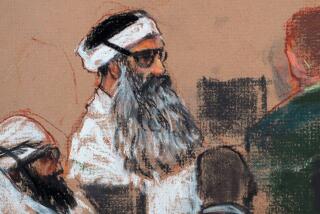Jury Spares Life of 2nd Terrorist in Bombing Case
- Share via
NEW YORK — Again stating that execution might turn a terrorist into a martyr, a federal court jury Tuesday spared the life of a second man convicted in the 1998 bombings of two U.S. embassies in East Africa that killed 224 people.
At the start of their third day of penalty-phase deliberations, the jurors announced that they could not reach agreement on whether Khalfan Khamis Mohamed, a 27-year-old native of Tanzania, should be executed. That deadlock means an automatic sentence of life in prison without the possibility of parole.
Mohamed showed no emotion upon hearing that the jury had saved him from a lethal injection.
He was one of four followers of Islamic militant Osama bin Laden whom the same jury in May found guilty of bombing the embassies in Nairobi, Kenya, and in Dar es Salaam, the capital of Tanzania. Prosecutors said that the almost simultaneous attacks, which also injured more than 4,500 people, were part of a worldwide plot to kill Americans. Bin Laden was indicted in connection with the embassy bombings. He is a fugitive and believed to be under the protection of the Taliban regime in Afghanistan.
On June 12, the jurors decided against sentencing Mohamed Rashed Daoud al-’Owhali, a 23-year-old Saudi Arabian, to death for the Nairobi bombing. He too received a life sentence. The two other men convicted of conspiracy in the case, 40-year-old Wadih El-Hage, a naturalized U.S. citizen born in Lebanon, and Mohamed Sadeek Odeh, a 35-year-old Jordanian, face automatic life sentences.
Defendant’s Efforts in Blasts Detailed
Mohamed had been convicted of murdering the 11 people who died in the Dar es Salaam explosion. Prosecutors charged that he had purchased a vehicle used to transport bomb components, rented the house used as the bomb factory and that he helped grind the TNT used in the device.
He was captured a year later, after fleeing to South Africa, where he worked in a fast food restaurant.
“This man decided on Aug. 7, 1998, that people could die in an embassy with a bomb he helped build, lined with TNT, and made sure the truck got there,” Assistant U.S. Atty. Patrick Fitzgerald told the jury during the penalty phase of the trial. “He didn’t [care] about the people he killed.”
Fitzgerald said that when Mohamed was caught, “he threatened to do it again.”
“What he has is ice in his veins, that’s what makes him more dangerous because he coldly, coolly decided, ‘I’ll kill,’ ” the prosecutor said. “Zero remorse.”
Government lawyers argued during the penalty phase that Mohamed would create a constant threat to guards and other correctional personnel if he were sentenced to life in prison.
They alleged that he had helped Mamdouh Mahmud Salim, another defendant awaiting trial in the embassy bombings, to attack a guard at the Metropolitan Correctional Center last November.
Attack on Prison Guard Cited by Prosecution
Guard Louis Pepe, 43, was stabbed in the eye with a sharpened comb, a wound that penetrated 2 1/2 inches into his brain, after being sprayed in the face with hot sauce. He was also stabbed in the skull with a sharpened hairbrush.
After the near-fatal attack, the guard, who lost the use of his eye, suffered a stroke that left him with partial paralysis and severely damaged his ability to speak and understand language.
Mohamed was never charged in the attack.
Both the prosecution and the defense factored into their penalty-phase arguments the attitude of the jurors who voted to spare al-’Owhali from execution.
In that case, 10 jurors thought that killing al-’Owhali could make him a martyr for terrorist causes.
“Send him [Mohamed] to jail and he’ll quickly be forgotten by all except those who love him,” defense attorney David Stern stressed. “Kill him and you’ve guaranteed him immortality. In the end, if you kill him, you’ll allow him to be used twice.”
“No terrorist attack is going to be stopped because someone gets a life sentence versus death,” Fitzgerald countered. “Osama bin Laden hates us.”
“In the government’s view, the just and appropriate sentence for the defendants Mohamed Rashed Daoud al-’Owhali and Khalfan Khamis Mohamed was the death penalty,” said U.S. Atty. Mary Jo White after the verdict. “But in our system of justice, the ultimate sentence of death requires the unanimous vote of all jurors. That is a critical safeguard, and we respect both the process and the jury’s efforts to reach a unanimous verdict.”
More to Read
Sign up for Essential California
The most important California stories and recommendations in your inbox every morning.
You may occasionally receive promotional content from the Los Angeles Times.













